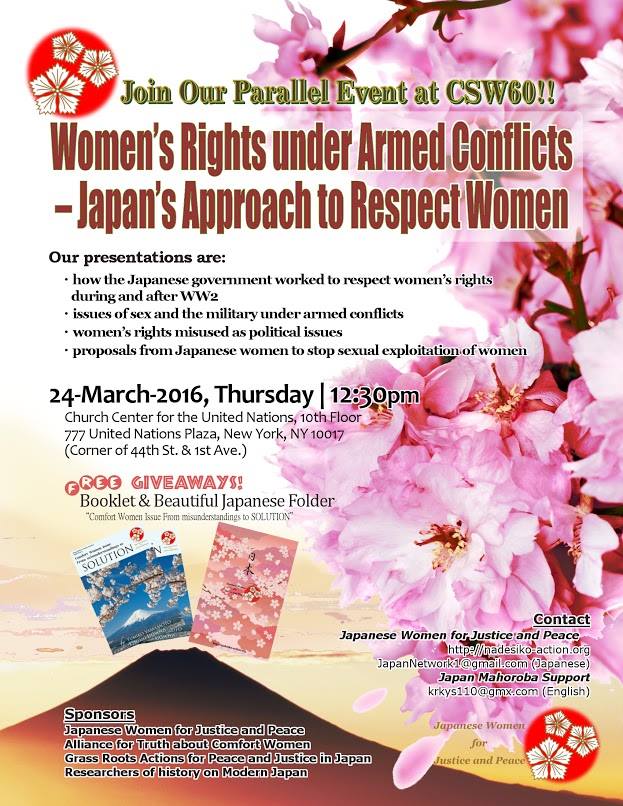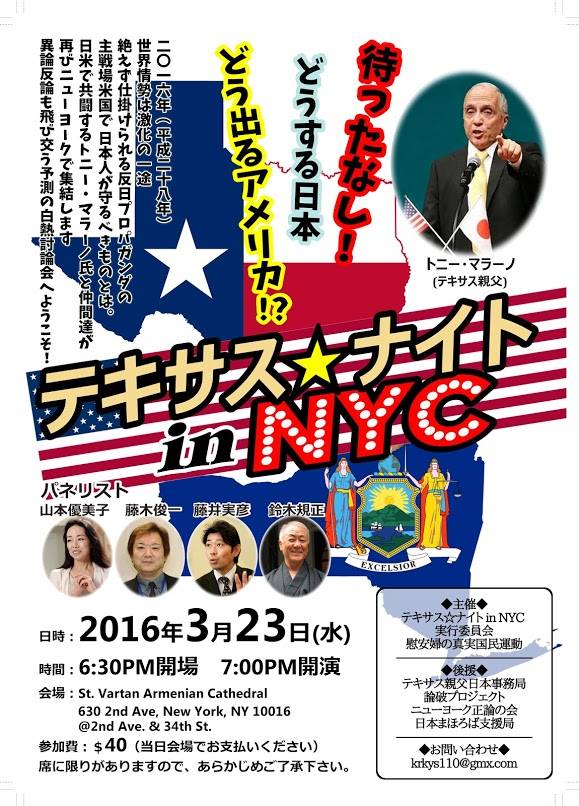*****************************************************************
「慰安婦は性奴隷が社の公式見解と宣言」しているのがジャパンタイムズです。
そのジャパンタイムズがマグロウヒル社に抗議する50人の日本の学者を批判する記事を掲載しました。
2015.12.11
Fifty Japanese scholars attack McGraw-Hill, U.S. academics on ‘comfort women’ issue
これに反論する山下 英次氏(大阪市立大学)のコラム「Challenging the ’20 American historians’」がジャパンタイムズ2016.3.9付(ペーパー版3.10付)で掲載されましたのでご紹介します。
日本語版はこちらをクリック
*****************************************************************
Japan Times
http://www.japantimes.co.jp/opinion/2016/03/09/commentary/japan-commentary/challenging-20-american-historians/#.VucbL5yLTIV
COMMENTARY / JAPAN
Challenging the ’20 American historians’
BY EIJI YAMASHITA (a professor emeritus at Osaka City University)
I organized “the 50 Japanese academics’ rebuttal of the 20 American historians’ statement,” which was announced last September and published in the December issue of Perspectives on History of the American Historical Association (AHA). This is the same periodical that published the 20 American historians’ statement last March. Our rebuttal was reported on in the Dec. 10 edition of The Japan Times and the December issue of Inside Higher Ed, an e-magazine on education based in Washington. I would like to take this opportunity to clarify the main aim of our rebuttal.
We said the 20 American historians would never find a single Japanese academician with whom they could stand, even though the title of their statement was “Standing with historians of Japan,” because there are at least eight factual mistakes in 26 lines about “comfort women” in the McGraw-Hill textbook at issue. Furthermore, we questioned their fairness since their statement had no reference to the report by the Interagency Working Group in the United States in 2007.
However, a more important reason for why we wrote the rebuttal is that we were concerned about the 20 American historians’ basic stance as scholars and educators, beyond the immediate comfort women issue. We were confident that our arguments could lead to better education for American youths, and hence were inherently beneficial to the U.S. as well as to the rest of the world in the longer perspective.
I think our concern was right. Several scholars, such as professor Alexis Dudden (University of Connecticut), professor Andrew Gordon (Harvard University) and others out of the 20 American historians were interviewed by The Japan Times or Inside Higher Ed, but none of them seemed to be worried about the education of young Americans. Moreover, it seems to me that American historians are still refusing to address the major factual errors in the McGraw-Hill history textbook.
Many English-language media outlets, including The Japan Times, refer to the comfort women as “sex slaves.” But such terminology is factually incorrect and runs counter to the Japanese government’s position. I hereby introduce the latest two examples. On Jan. 18, Prime Minister Shinzo Abe replied to a question raised by Upper House member Kyoko Nakayama in the Upper House Budget Committee that the phrases “sex slaves” and “200,000 comfort women” run counter to the facts. Moreover, on Feb. 16 Deputy Foreign Minister Shinsuke Sugiyama replied to a question raised by the United Nations Convention on the Elimination of All Forms of Discrimination against Women (CEDAW) in Geneva that there was no evidence proving the forcible removal of comfort women from their homes by the Japanese military and government authorities.
There is a widespread misunderstanding among the Western world that the Abe administration is somehow suppressing the media. It seems to us that the situation is precisely the opposite. In fact, the reach of the Abe administration’s efforts is rather limited by both the domestic and foreign media. Japan is among the highest ranked countries in the world in terms of freedom of speech. On the contrary, freedom of speech in the U.S. is obviously lower than that of Western European countries or Japan, because there are so many social taboos there. To take just one prominent example out of many, the U.S. government actively oppresses denunciations by former governmental staff members. Given all this, it would seem that Americans are not in a position to lecture other mature democracies on the finer points of freedom of speech. Instead, the 20 American historians should be more concerned about the free speech situation within their own country.
Upon its commencement in October 1998, the research objective of the IWG Report was limited to Nazi war crimes. Thereafter, though, Japanese Imperial government records were added to the objectives of the IWG Report in December 2000 in response to a request from the Global Alliance for Preserving the History of World War II in Asia, a group led by people of Chinese descent based in San Francisco. After very extensive research lasting seven years, the IWG could not find any documentation to show that the Japanese government committed war crimes with respect to the comfort women. In the IWG Final Report to the U.S. Congress, a document stretching 155 pages, there is no language clearly indicating that any record of Japanese war crimes vis-a-vis comfort women had been uncovered. Instead, the report contains reams of unimportant passages, presumably with the aim of camouflaging an inconvenient truth.
But despite no evidence of war crimes by the Japanese government in the IWG Report to the U.S. Congress, on July 30, 2007, the U.S. Congress still passed House Resolution 121 on the comfort women, demanding that the Japanese government apologize for “crimes” for which no evidence had been produced. The whole process in the U.S. Congress at that time was extremely unfair — or worse — to Japan.
Today, American fairness is in serious question almost everywhere in the world, although most Americans may not know this or do not wish to know. This broad lack of trust in American fairness is one of the major factors in the failure of American foreign policy on so many fronts in the past decades. Under such circumstances, is it wise for the U.S. to show apparent unfairness to the Japanese public, too, especially given that Japan is one of the closest American allies in the world? If the U.S. wishes to see its foreign policy succeed, it should begin with a reassessment of its fundamental fairness. The safety of Americans and of the rest of the world depends on it.
It is often said that we cannot acquire a clear picture of any given era of history until at least a century has elapsed. Since we are now 71 years past the end of World War II, it is natural that new evidence or interpretations will emerge in the years to come. Not only newly found historical facts but also new historical interpretations should be respected and subjected to academic discussion and debate. Incidentally, this year marks the 102nd anniversary of the outbreak of World War I, but we still lack a coherent historical evaluation of even that conflict.
And yet, these same Americans who have striven to fashion a consensus regardless of where the evidence leads them are quick to call us revisionists. But isn’t it always important for open-minded scholars to seek revisions when they are appropriate? Those who cry “revisionism” are unscientific; they do not behave like intellectuals. Perhaps it is time for us to return the favor and label them the “bigoted old guard.”
On this note, it is also important for us to begin to discuss the meaning of the latest world war, the Cold War, particularly in connection with World War II. It is indispensable to correctly recognize why the Cold War began soon after the end of World War II in order to clarify the characteristics of the “hot war.” It is also very important to review how we in the free world won the Cold War.
Finally, to return to our original point, McGraw-Hill Education in New York should sincerely address the major factual defects in its history textbook for the future generation of the U.S. and the rest of the world as well.
(End)


